
From September 2, 2013, that's "Just Keep Lying Campaign." C.I. noted:
Secretary of State John Kerry declares, "Yes, it's me. 69 year old John Kerry looking as fresh faced and wrinkle free as an Abercrombie and Fitch model. I'm here to tell you that I have hair and blood samples proving chemicals were used in Syria." He adds, "I'd have semen samples too but at 69 I need at least a 24-hour heads up and two Viagra." Isaiah archives his comics at The World Today Just Nuts.
I find it amazing that John Kerry gets work done and it's not even a big topic. An elderly man in the government and he's having a late-life crisis.
Here's C.I.'s "Iraq snapshot:"
Saturday, April 23, 2016. Chaos and violence continue, the US
government admits killing Iraqi civilians in the bombs dropped from war
planes each day, Haider al-Abadi continues pushing for reforms or
'reforms,' Moqtada issues a call to his followers, and much more.
Today, the US Defense Dept announced:
Strikes in Iraq
Bomber, fighter, and remotely piloted aircraft conducted 22 strikes in Iraq, coordinated with and in support of Iraq’s government:
-- Near Baghdadi, two strikes struck an ISIL bunker complex and destroyed two ISIL fighting positions.
-- Near Beiji, a strike destroyed three ISIL bunkers.
-- Near Fallujah, eight strikes struck six separate ISIL tactical units and destroyed three ISIL fighting positions, an ISIL heavy machine gun, three ISIL vehicles, and denied ISIL access to terrain.
-- Near Kirkuk, two strikes struck two separate ISIL tactical units and destroyed an ISIL command and control node, an ISIL vehicle, two ISIL assembly areas, and an ISIL bomb storage facility.
-- Near Kisik, a strike struck an ISIL tactical unit and destroyed an ISIL tunnel entrance.
-- Near Mosul, five strikes struck three separate ISIL tactical units and destroyed an ISIL weapons cache, an ISIL assembly area, and three ISIL supply caches and suppressed two separate ISIL fighting positions.
-- Near Qayyarah, a strike produced inconclusive results.
-- Near Sinjar, two strikes destroyed an ISIL bomb and two ISIL asphalt steamrollers.
Task force officials define a strike as one or more kinetic events that occur in roughly the same geographic location to produce a single, sometimes cumulative, effect. Therefore, officials explained, a single aircraft delivering a single weapon against a lone ISIL vehicle is one strike, but so is multiple aircraft delivering dozens of weapons against buildings, vehicles and weapon systems in a compound, for example, having the cumulative effect of making those targets harder or impossible for ISIL to use. Accordingly, officials said, they do not report the number or type of aircraft employed in a strike, the number of munitions dropped in each strike, or the number of individual munition impact points against a target. Ground-based artillery fired in counterfire or in fire support to maneuver roles is not classified as a strike.
The daily bombings have also been carried out in Syria. And CBS NEWS and AP report:
In announcing the results of several investigations stemming from allegations of civilian casualties, U.S. Central Command said it concluded "the preponderance of evidence" indicates 20 civilians were killed and 11 others wounded in nine attacks between Sept. 10, 2015, and Feb. 2, 2016. All were judged to have been the unintended result of attacks on legitimate targets.
Of CENTCOM, BBC NEWS adds, "It said it deeply regretted the unintentional loss of life.
It said a total of 41 civilians had been killed since the air strikes began in 2014. Some human rights groups say the figure is much higher." Lizzie Dearden (INDEPDENT) notes, "Monitors from the independent NGO said the civilian death toll from air strikes by the US-led coalition was due to pass 1,000 last month. The figure was described in Parliament as 'credible', sparking calls for Britain and other member states to release reports."
At least a thousand, according to an independent estimate.
At least a thousand civilians killed by these 'precision' bombings.
Where is the outrage in America?
Where are the protests?
But then, where are the protests over the continuing Iraq War?
The editorial board of THE TOLEDO BLADE points out:
The Iraq War never ends.
Nor do Hillary Clinton's excuses for voting it and supporting it through 2007.
By contrast, Senator Bernie Sanders voted against it.
At a Baltimore rally today, Harper Neidig (THE HILL) reports, Senator Bernie Sanders declared, "The most important foreign policy debate in the modern history of this country took place in 2002 over the war in Iraq. I listened very carefully to what President Bush and Dick Cheney and the others had to say. I did not believe them, I helped lead the opposition. Secretary Clinton heard the same evidence that I did; she voted for that war. As secretary of State, she initiated and helped lead the effort to help overthrow the government of Libya, which brought mass instability to that region."
Thursday, War Hawk Hillary Diane appeared on ABC's GOOD MORNING AMERICA to sputter:
Well, I guess my-my greatest regret, uhm, was, uh, voting to give President Bush authority in Iraq. Uhm, it did not turn out the way I thought it would based on what he had said, uh, and I regret that. I've said it was a mistake and, uh, obviously, uh, it's something I-I wish hadn't turned out the way it did.
Even she couldn't get it out in a believable manner.
Stumbling and sputtering, she tried to rewrite history yet again.
In the face of Hillary's latest revision, it's worth again noting Stephen Zunes providing reality about Hillary's Iraq history:
Furthermore, if then-Senator Clinton’s desire was simply to push Saddam into complying with the inspection process, she wouldn’t have voted against the substitute Levin amendment, which would have also granted President Bush authority to use force, but only if Iraq defied subsequent UN demands regarding the inspections process. Instead, Clinton voted for a Republican-sponsored resolution to give Bush the authority to invade Iraq at the time and circumstances of his own choosing.
In fact, unfettered large-scale weapons inspections had been going on in Iraq for nearly four months at the time the Bush administration launched the March 2003 invasion. Despite the UN weapons inspectors having not found any evidence of WMDs or active WMD programs after months of searching, Clinton made clear that the United States should invade Iraq anyway. Indeed, she asserted that even though Saddam was in full compliance with the UN Security Council, he nevertheless needed to resign as president, leave the country, and allow U.S. troops to occupy the country. “The president gave Saddam Hussein one last chance to avoid war,” Clinton said in a statement, “and the world hopes that Saddam Hussein will finally hear this ultimatum, understand the severity of those words, and act accordingly.”
When Saddam refused to resign and the Bush administration launched the invasion, Clinton went on record calling for “unequivocal support” for Bush’s “firm leadership and decisive action” as “part of the ongoing Global War on Terrorism.” She insisted that Iraq was somehow still “in material breach of the relevant United Nations resolutions” and, despite the fact that weapons inspectors had produced evidence to the contrary, claimed the invasion was necessary to “neutralize Iraq’s weapons of mass destruction.”
Julia Sharpe-Levine (HUFFINGTON POST) adds:
Her assertion that her vote for the Iraq War was “the best decision I [could’ve made] with the information I had” is deceitful considering that prior to voting, she neglected to read the 92-page classified National Intelligence Estimate (NIE) on Iraq’s weapons of mass destruction circulated to the Senate for review by the Bush administration. The NIE went into great detail about the objections raised by the State Department and Department of Energy to claims of nuclear-weapons in Iraq, and led multiple senators, including Bob Graham of Florida, to vote against the war resolution.
Bully Boy Bush tricked her, she whined this week.
But how stupid do you have to be to be in order to be tricked by Bully Boy Bush?
More to the point, how can you be 'tricked' when you don't even do the basic work required?
Hillary voted without doing the National Intelligence Estimate?
Well, no one's ever accused her of possessing an overabundance of intelligence.
Retired Lt Col William Astore (HUFFINGTON POST) observes:
The recent statement of U.S. Democratic presidential front-runner Hillary Clinton has met with great skepticism in Libya, especially her regret for the 2003 intervention in Iraq, according to Libyan officials.
[. . .]
"The recent statement of Clinton is nothing but political advocacy for her voters," said Atef Badri, a former Libyan diplomat.
He believes this apology and regret for the military campaign that led to the destruction of Iraq will not change the "ugly face" on Washington's foreign policy.
The former diplomat said when Clinton was a prominent senator in 2002, she strongly advocated for a military campaign that was apparently aimed to overthrow Saddam Hussein's regime.
"However, the hidden side of her support to the campaign was to destroy Iraq's scientific capabilities and infrastructure. The world saw how fancy the U.S. air force was in destroying the government offices, factories, and bridges," Badri added.
Meanwhile, AFP notes, "A suicide attack claimed by the Islamic State group killed at least eight people at a mosque on the southwestern edge of Baghdad on Friday, security and medical officials said." Ayad Allawi, leader of Iraqiya, tells NATIONAL IRAQI NEWS AGENCY that the bombing is an attempt to destroy the social fabric of Iraq and to promote sectarianism.
ALSUMARIA notes a Husseiniya car bombing killed 1 Iraqi soldier and left four more injured.
As the violence continues, so does the political intrigue.
An alliance has apparently fallen. DAR ADDUSTOUR reports that the Kurdish alliance has broken and that the PUK has announced they will not continue to align with the KDP -- the split is said to be between former president of Iraq Jalal Talabani and his supporters in the PUK and KRG President Massoud Barzani and his supporters in the KDP.
The split comes as the US-installed prime minister Haider al-Abadi is demanding that he get a new Cabinet. That's a confession of his own failures as prime minister. He picked his Cabinet back in 2014 -- picking the ministers and having Parliament approve them is how someone moves from prime minister-designate to prime minister per Iraq's constitution. Haider's requesting a new Cabinet less than two years later is a confession of his own failure. (IRAQ TIMES published a photo of Haider from when he was less than a year-old, FYI.)
He has some support for his proposals including from Shi'ite cleric and movement leader Moqtada al-Sadr. ALSUMARIA notes Moqtada called on his followers to continue protesting in Baghdad in favor of Haider's demands -- and to continue protesting until at least Monday. ALL IRAQ NEWS explains that Moqtada wants the Parliament to vote on Haider's proposals Monday. While they continue protesting in Baghdad's Tahrir Square, there are MPs protesting in the Parliament as well.
Salim al-Jubouri remains Speaker of Parliament despite an April 14th attempt to vote the most powerful Sunni politician out of office (they did not have a quorum so the vote did not count). ALSUMARIA notes that he has stated Parliament will be resuming business and voting on Haider's proposal in this coming week.
Mohammad Sabah (AL MADA) reports that Salim is attempting to get the protesting MPs to cease their protest. However, the protesters include Nouri al-Maliki's State of Law coalition and they're not budging. NINA quotes State of Law's Mutasim Mansour Baaja declaring that the sit in will continue and that they believe the vote to oust Salim as Speaker was a valid and legal vote.
As Sheikh (DAR ADDUSTOUR) pens a column noting the intrigue and rumor surrounding the various efforts and concludes that merely shuffling politicians will not cure Iraq's government because what is actually needed is a vision of a better Iraq.
Saleh al-Mutlaq is the leader of the National Dialogue Front, a Sunni bloc. ALSUMARIA reports that he has stated there is an effort afoot to change the three presidencies -- Speaker of Parliament, President and Prime Minister -- to those who would do the bidding of the government of Iran. Suadad al-Salhy (MIDDLE EAST MONITOR) focuses on Nouri al-Maliki's role in the upheaval:
To stop the train – or at least to reroute it – figures involved in talks told MEE that the heads of political blocs must negotiate with Maliki, who controls more than two-thirds of the rebellious MPs.
"Those who led the coup were Maliki's MPs and were under his supervision," said a senior Shia leader familiar with the current political bloc negotiations, who spoke to MEE on condition of anonymity. "I have all the text messages and instructions he sent to his people," the leader said. "He is the one holding all the strings of the game. He can keep it up or end it."
Maliki governed Iraq between 2006 and 2014. Despite winning the highest share of the vote in 2014, he was blocked from a third term by political rivals and Shia clergymen after many Iraqis blamed him for the spectacular loss of almost a third of Iraqi territory to the Islamic State (IS) group. Abadi, Maliki's political party mate, in cooperation with Maliki's Shia, Sunni and Kurd rivals, succeeded him to the top office.
Maliki was appointed vice president, but Abadi, in response to massive demonstrations, abolished Maliki's post last August as part of his first package of reforms. Since then, the tension between Maliki and his rivals has been high.
iraq
the toledo blade
xinhua
Read on ...
Today, the US Defense Dept announced:
Strikes in Iraq
Bomber, fighter, and remotely piloted aircraft conducted 22 strikes in Iraq, coordinated with and in support of Iraq’s government:
-- Near Baghdadi, two strikes struck an ISIL bunker complex and destroyed two ISIL fighting positions.
-- Near Beiji, a strike destroyed three ISIL bunkers.
-- Near Fallujah, eight strikes struck six separate ISIL tactical units and destroyed three ISIL fighting positions, an ISIL heavy machine gun, three ISIL vehicles, and denied ISIL access to terrain.
-- Near Kirkuk, two strikes struck two separate ISIL tactical units and destroyed an ISIL command and control node, an ISIL vehicle, two ISIL assembly areas, and an ISIL bomb storage facility.
-- Near Kisik, a strike struck an ISIL tactical unit and destroyed an ISIL tunnel entrance.
-- Near Mosul, five strikes struck three separate ISIL tactical units and destroyed an ISIL weapons cache, an ISIL assembly area, and three ISIL supply caches and suppressed two separate ISIL fighting positions.
-- Near Qayyarah, a strike produced inconclusive results.
-- Near Sinjar, two strikes destroyed an ISIL bomb and two ISIL asphalt steamrollers.
Task force officials define a strike as one or more kinetic events that occur in roughly the same geographic location to produce a single, sometimes cumulative, effect. Therefore, officials explained, a single aircraft delivering a single weapon against a lone ISIL vehicle is one strike, but so is multiple aircraft delivering dozens of weapons against buildings, vehicles and weapon systems in a compound, for example, having the cumulative effect of making those targets harder or impossible for ISIL to use. Accordingly, officials said, they do not report the number or type of aircraft employed in a strike, the number of munitions dropped in each strike, or the number of individual munition impact points against a target. Ground-based artillery fired in counterfire or in fire support to maneuver roles is not classified as a strike.
The daily bombings have also been carried out in Syria. And CBS NEWS and AP report:
In announcing the results of several investigations stemming from allegations of civilian casualties, U.S. Central Command said it concluded "the preponderance of evidence" indicates 20 civilians were killed and 11 others wounded in nine attacks between Sept. 10, 2015, and Feb. 2, 2016. All were judged to have been the unintended result of attacks on legitimate targets.
Of CENTCOM, BBC NEWS adds, "It said it deeply regretted the unintentional loss of life.
It said a total of 41 civilians had been killed since the air strikes began in 2014. Some human rights groups say the figure is much higher." Lizzie Dearden (INDEPDENT) notes, "Monitors from the independent NGO said the civilian death toll from air strikes by the US-led coalition was due to pass 1,000 last month. The figure was described in Parliament as 'credible', sparking calls for Britain and other member states to release reports."
At least a thousand, according to an independent estimate.
At least a thousand civilians killed by these 'precision' bombings.
Where is the outrage in America?
Where are the protests?
But then, where are the protests over the continuing Iraq War?
The editorial board of THE TOLEDO BLADE points out:
The United States still has 4,000
troops in Iraq, nearly five years after President George W. Bush agreed
with the then-Iraqi government that all U.S. troops would be withdrawn
by the end of 2011. President Obama pledged to end the war in Iraq as
part of his 2008 election campaign, a promise he has not fulfilled,
bending to pressure from the Pentagon and Washington’s other advocates
of a continued U.S. military presence.
In principle, U.S. troops are in Iraq in the context of advising and supplying Iraqi armed forces, not in a combat role. However, it emerged last month that Marines maintain an independent fire base in northern Iraq and are expected to play a critical role in carrying out the plan of Iraqi forces to free Mosul, the country’s second-largest city, from Islamic State in Iraq and Syria control. ISIS has held Mosul since June, 2014.
In principle, U.S. troops are in Iraq in the context of advising and supplying Iraqi armed forces, not in a combat role. However, it emerged last month that Marines maintain an independent fire base in northern Iraq and are expected to play a critical role in carrying out the plan of Iraqi forces to free Mosul, the country’s second-largest city, from Islamic State in Iraq and Syria control. ISIS has held Mosul since June, 2014.
The Iraq War never ends.
Nor do Hillary Clinton's excuses for voting it and supporting it through 2007.
By contrast, Senator Bernie Sanders voted against it.
At a Baltimore rally today, Harper Neidig (THE HILL) reports, Senator Bernie Sanders declared, "The most important foreign policy debate in the modern history of this country took place in 2002 over the war in Iraq. I listened very carefully to what President Bush and Dick Cheney and the others had to say. I did not believe them, I helped lead the opposition. Secretary Clinton heard the same evidence that I did; she voted for that war. As secretary of State, she initiated and helped lead the effort to help overthrow the government of Libya, which brought mass instability to that region."
Thursday, War Hawk Hillary Diane appeared on ABC's GOOD MORNING AMERICA to sputter:
Well, I guess my-my greatest regret, uhm, was, uh, voting to give President Bush authority in Iraq. Uhm, it did not turn out the way I thought it would based on what he had said, uh, and I regret that. I've said it was a mistake and, uh, obviously, uh, it's something I-I wish hadn't turned out the way it did.
Even she couldn't get it out in a believable manner.
Stumbling and sputtering, she tried to rewrite history yet again.
In the face of Hillary's latest revision, it's worth again noting Stephen Zunes providing reality about Hillary's Iraq history:
1. “Hillary Clinton’s vote wasn’t for war, but simply to pressure Saddam Hussein to allow UN weapons inspectors back into Iraq.”
At the time of vote, Saddam Hussein had already agreed in principle to a return of the weapons inspectors. His government was negotiating with the United Nations Monitoring and Verification Commission on the details, which were formally institutionalized a few weeks later. (Indeed, it would have been resolved earlier had the United States not repeatedly postponed a UN Security Council resolution in the hopes of inserting language that would have allowed Washington to unilaterally interpret the level of compliance.)Furthermore, if then-Senator Clinton’s desire was simply to push Saddam into complying with the inspection process, she wouldn’t have voted against the substitute Levin amendment, which would have also granted President Bush authority to use force, but only if Iraq defied subsequent UN demands regarding the inspections process. Instead, Clinton voted for a Republican-sponsored resolution to give Bush the authority to invade Iraq at the time and circumstances of his own choosing.
In fact, unfettered large-scale weapons inspections had been going on in Iraq for nearly four months at the time the Bush administration launched the March 2003 invasion. Despite the UN weapons inspectors having not found any evidence of WMDs or active WMD programs after months of searching, Clinton made clear that the United States should invade Iraq anyway. Indeed, she asserted that even though Saddam was in full compliance with the UN Security Council, he nevertheless needed to resign as president, leave the country, and allow U.S. troops to occupy the country. “The president gave Saddam Hussein one last chance to avoid war,” Clinton said in a statement, “and the world hopes that Saddam Hussein will finally hear this ultimatum, understand the severity of those words, and act accordingly.”
When Saddam refused to resign and the Bush administration launched the invasion, Clinton went on record calling for “unequivocal support” for Bush’s “firm leadership and decisive action” as “part of the ongoing Global War on Terrorism.” She insisted that Iraq was somehow still “in material breach of the relevant United Nations resolutions” and, despite the fact that weapons inspectors had produced evidence to the contrary, claimed the invasion was necessary to “neutralize Iraq’s weapons of mass destruction.”
Julia Sharpe-Levine (HUFFINGTON POST) adds:
Her assertion that her vote for the Iraq War was “the best decision I [could’ve made] with the information I had” is deceitful considering that prior to voting, she neglected to read the 92-page classified National Intelligence Estimate (NIE) on Iraq’s weapons of mass destruction circulated to the Senate for review by the Bush administration. The NIE went into great detail about the objections raised by the State Department and Department of Energy to claims of nuclear-weapons in Iraq, and led multiple senators, including Bob Graham of Florida, to vote against the war resolution.
Bully Boy Bush tricked her, she whined this week.
But how stupid do you have to be to be in order to be tricked by Bully Boy Bush?
More to the point, how can you be 'tricked' when you don't even do the basic work required?
Hillary voted without doing the National Intelligence Estimate?
Well, no one's ever accused her of possessing an overabundance of intelligence.
Retired Lt Col William Astore (HUFFINGTON POST) observes:
No more
nonsense about being a touchy-feely progressive like Bernie Sanders.
It’s time for Hillary the Hawk to take charge and soar, preempting any
criticism by Republicans that she’ll be “weak” on defense.
But, tell me
again, how did America’s wars in Iraq, Afghanistan, Libya, and elsewhere
go for the United States? At least three trillion dollars lost, tens
of thousands of U.S. troops killed and wounded, hundreds of thousands of
“foreigners” killed and wounded, millions made refugees, and for what,
exactly?
Hillary the
Hawk wants to double-down on a losing hand. That’s neither “aggressive”
nor “tough”: It’s reckless and dumb. Worst of all, she’s playing with
our chips as well as the lives of our troops, not to mention the lives
of all those “foreigners” seeking shelter from American bombs and
bullets and drones. (But we have a word for them: collateral damage.)
Her latest lie did not go over well in Libya. Mahmoud Darwesh (XINHUA) reports from Tripoli:
Her latest lie did not go over well in Libya. Mahmoud Darwesh (XINHUA) reports from Tripoli:
The recent statement of U.S. Democratic presidential front-runner Hillary Clinton has met with great skepticism in Libya, especially her regret for the 2003 intervention in Iraq, according to Libyan officials.
[. . .]
"The recent statement of Clinton is nothing but political advocacy for her voters," said Atef Badri, a former Libyan diplomat.
He believes this apology and regret for the military campaign that led to the destruction of Iraq will not change the "ugly face" on Washington's foreign policy.
The former diplomat said when Clinton was a prominent senator in 2002, she strongly advocated for a military campaign that was apparently aimed to overthrow Saddam Hussein's regime.
"However, the hidden side of her support to the campaign was to destroy Iraq's scientific capabilities and infrastructure. The world saw how fancy the U.S. air force was in destroying the government offices, factories, and bridges," Badri added.
Meanwhile, AFP notes, "A suicide attack claimed by the Islamic State group killed at least eight people at a mosque on the southwestern edge of Baghdad on Friday, security and medical officials said." Ayad Allawi, leader of Iraqiya, tells NATIONAL IRAQI NEWS AGENCY that the bombing is an attempt to destroy the social fabric of Iraq and to promote sectarianism.
ALSUMARIA notes a Husseiniya car bombing killed 1 Iraqi soldier and left four more injured.
As the violence continues, so does the political intrigue.
An alliance has apparently fallen. DAR ADDUSTOUR reports that the Kurdish alliance has broken and that the PUK has announced they will not continue to align with the KDP -- the split is said to be between former president of Iraq Jalal Talabani and his supporters in the PUK and KRG President Massoud Barzani and his supporters in the KDP.
The split comes as the US-installed prime minister Haider al-Abadi is demanding that he get a new Cabinet. That's a confession of his own failures as prime minister. He picked his Cabinet back in 2014 -- picking the ministers and having Parliament approve them is how someone moves from prime minister-designate to prime minister per Iraq's constitution. Haider's requesting a new Cabinet less than two years later is a confession of his own failure. (IRAQ TIMES published a photo of Haider from when he was less than a year-old, FYI.)
He has some support for his proposals including from Shi'ite cleric and movement leader Moqtada al-Sadr. ALSUMARIA notes Moqtada called on his followers to continue protesting in Baghdad in favor of Haider's demands -- and to continue protesting until at least Monday. ALL IRAQ NEWS explains that Moqtada wants the Parliament to vote on Haider's proposals Monday. While they continue protesting in Baghdad's Tahrir Square, there are MPs protesting in the Parliament as well.
Salim al-Jubouri remains Speaker of Parliament despite an April 14th attempt to vote the most powerful Sunni politician out of office (they did not have a quorum so the vote did not count). ALSUMARIA notes that he has stated Parliament will be resuming business and voting on Haider's proposal in this coming week.
Mohammad Sabah (AL MADA) reports that Salim is attempting to get the protesting MPs to cease their protest. However, the protesters include Nouri al-Maliki's State of Law coalition and they're not budging. NINA quotes State of Law's Mutasim Mansour Baaja declaring that the sit in will continue and that they believe the vote to oust Salim as Speaker was a valid and legal vote.
As Sheikh (DAR ADDUSTOUR) pens a column noting the intrigue and rumor surrounding the various efforts and concludes that merely shuffling politicians will not cure Iraq's government because what is actually needed is a vision of a better Iraq.
Saleh al-Mutlaq is the leader of the National Dialogue Front, a Sunni bloc. ALSUMARIA reports that he has stated there is an effort afoot to change the three presidencies -- Speaker of Parliament, President and Prime Minister -- to those who would do the bidding of the government of Iran. Suadad al-Salhy (MIDDLE EAST MONITOR) focuses on Nouri al-Maliki's role in the upheaval:
To stop the train – or at least to reroute it – figures involved in talks told MEE that the heads of political blocs must negotiate with Maliki, who controls more than two-thirds of the rebellious MPs.
"Those who led the coup were Maliki's MPs and were under his supervision," said a senior Shia leader familiar with the current political bloc negotiations, who spoke to MEE on condition of anonymity. "I have all the text messages and instructions he sent to his people," the leader said. "He is the one holding all the strings of the game. He can keep it up or end it."
Maliki governed Iraq between 2006 and 2014. Despite winning the highest share of the vote in 2014, he was blocked from a third term by political rivals and Shia clergymen after many Iraqis blamed him for the spectacular loss of almost a third of Iraqi territory to the Islamic State (IS) group. Abadi, Maliki's political party mate, in cooperation with Maliki's Shia, Sunni and Kurd rivals, succeeded him to the top office.
Maliki was appointed vice president, but Abadi, in response to massive demonstrations, abolished Maliki's post last August as part of his first package of reforms. Since then, the tension between Maliki and his rivals has been high.
iraq
the toledo blade
xinhua

 Brett McGurk
Brett McGurk
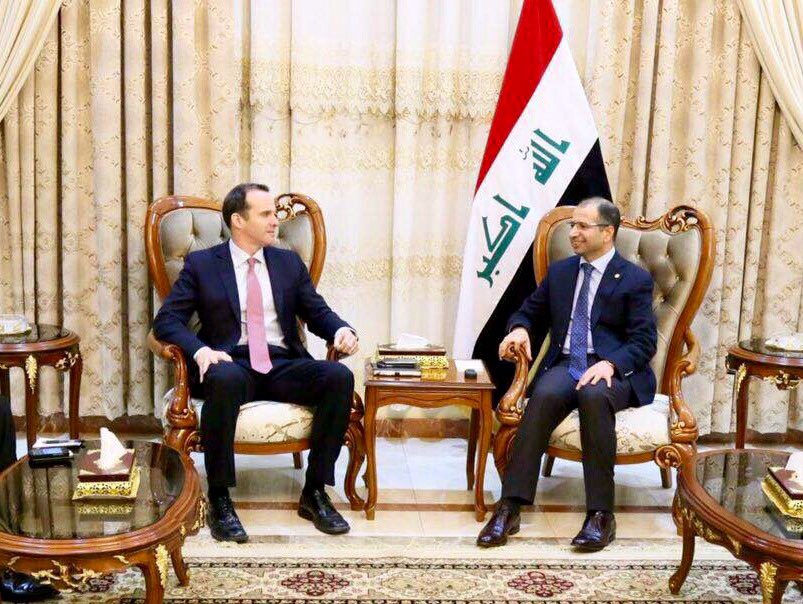
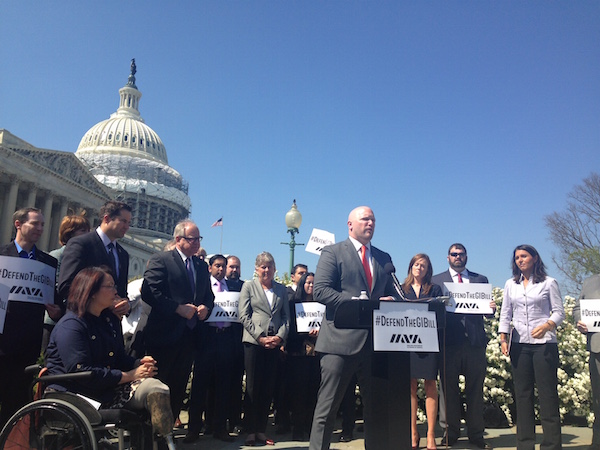
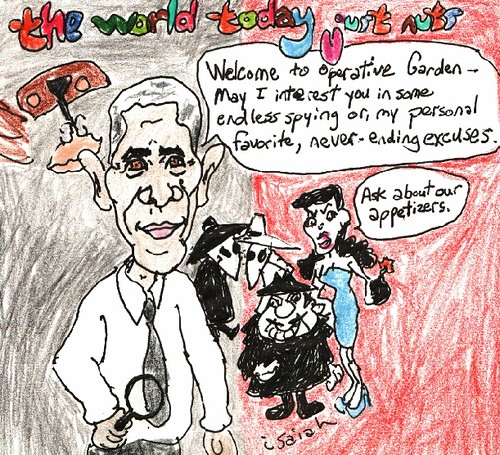
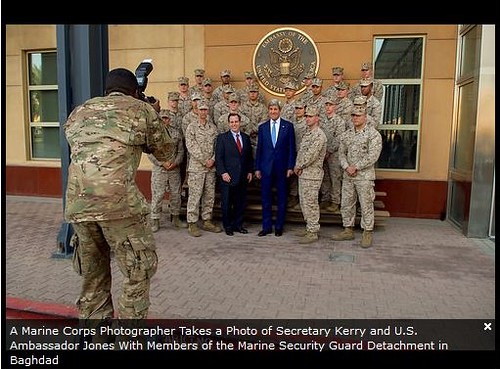
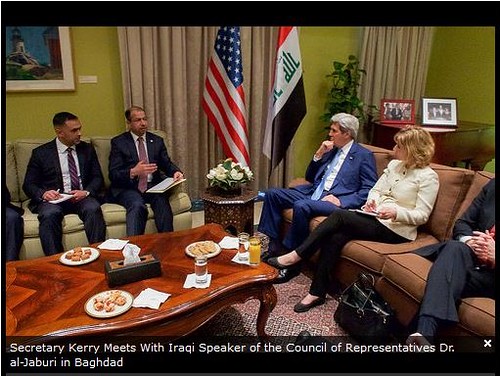
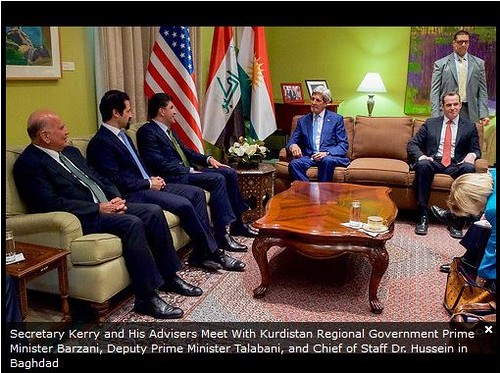
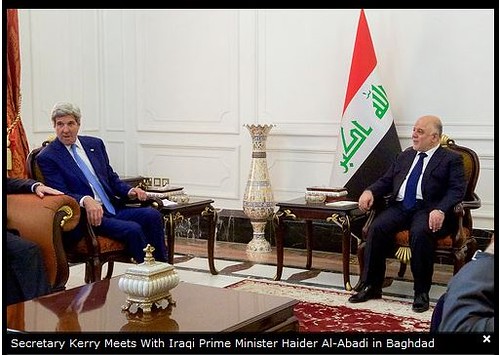
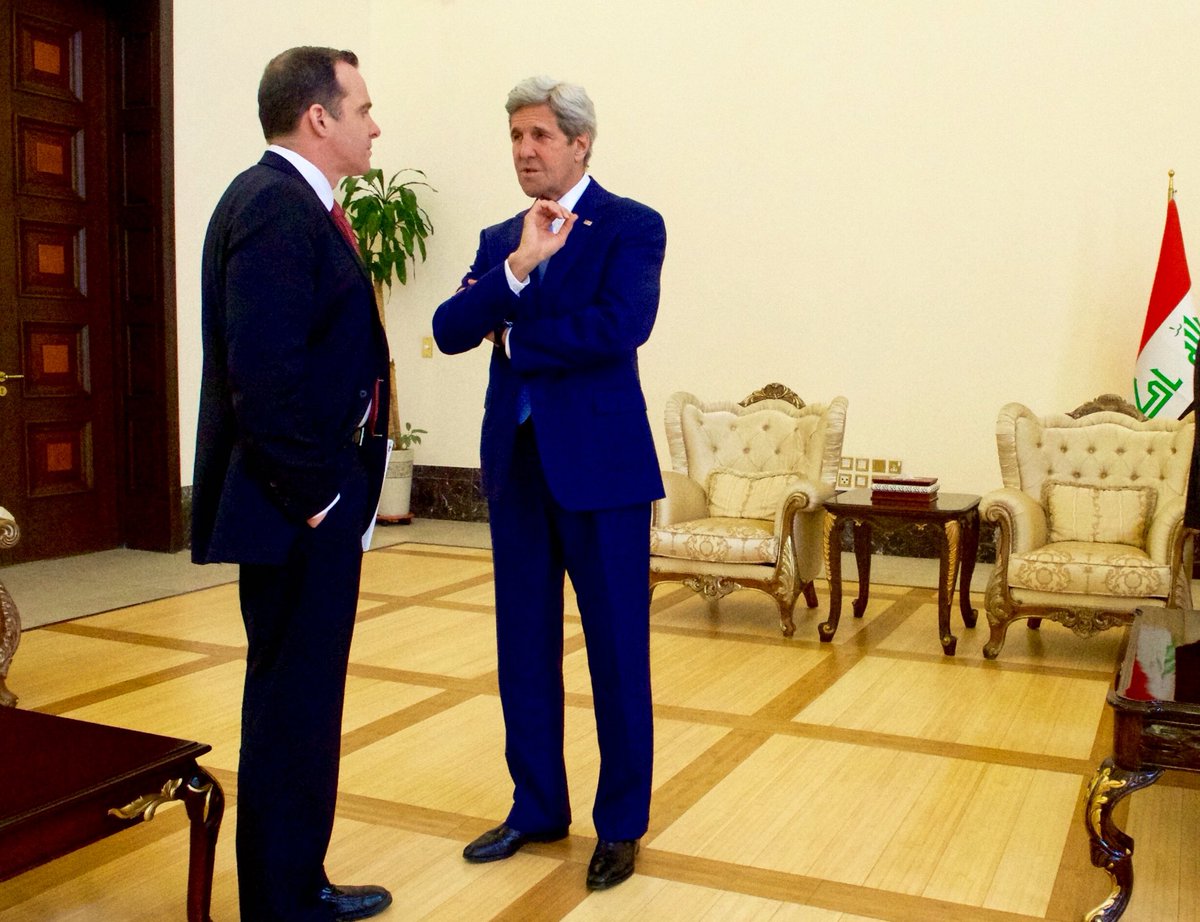
 #IRAQ شمرية العراق
#IRAQ شمرية العراق 




